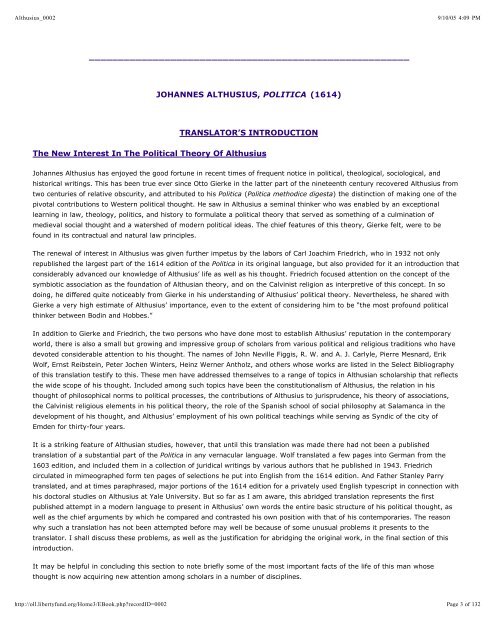Johannes Althusius: Politica - Hubertlerch.com - HubertLerch.com
Johannes Althusius: Politica - Hubertlerch.com - HubertLerch.com
Johannes Althusius: Politica - Hubertlerch.com - HubertLerch.com
Create successful ePaper yourself
Turn your PDF publications into a flip-book with our unique Google optimized e-Paper software.
<strong>Althusius</strong>_0002<br />
9/10/05 4:09 PM<br />
_______________________________________________________<br />
JOHANNES ALTHUSIUS, POLITICA (1614)<br />
TRANSLATOR’S INTRODUCTION<br />
The New Interest In The <strong>Politica</strong>l Theory Of <strong>Althusius</strong><br />
<strong>Johannes</strong> <strong>Althusius</strong> has enjoyed the good fortune in recent times of frequent notice in political, theological, sociological, and<br />
historical writings. This has been true ever since Otto Gierke in the latter part of the nineteenth century recovered <strong>Althusius</strong> from<br />
two centuries of relative obscurity, and attributed to his <strong>Politica</strong> ( <strong>Politica</strong> methodice digesta) the distinction of making one of the<br />
pivotal contributions to Western political thought. He saw in <strong>Althusius</strong> a seminal thinker who was enabled by an exceptional<br />
learning in law, theology, politics, and history to formulate a political theory that served as something of a culmination of<br />
medieval social thought and a watershed of modern political ideas. The chief features of this theory, Gierke felt, were to be<br />
found in its contractual and natural law principles.<br />
The renewal of interest in <strong>Althusius</strong> was given further impetus by the labors of Carl Joachim Friedrich, who in 1932 not only<br />
republished the largest part of the 1614 edition of the <strong>Politica</strong> in its original language, but also provided for it an introduction that<br />
considerably advanced our knowledge of <strong>Althusius</strong>’ life as well as his thought. Friedrich focused attention on the concept of the<br />
symbiotic association as the foundation of Althusian theory, and on the Calvinist religion as interpretive of this concept. In so<br />
doing, he differed quite noticeably from Gierke in his understanding of <strong>Althusius</strong>’ political theory. Nevertheless, he shared with<br />
Gierke a very high estimate of <strong>Althusius</strong>’ importance, even to the extent of considering him to be “the most profound political<br />
thinker between Bodin and Hobbes.”<br />
In addition to Gierke and Friedrich, the two persons who have done most to establish <strong>Althusius</strong>’ reputation in the contemporary<br />
world, there is also a small but growing and impressive group of scholars from various political and religious traditions who have<br />
devoted considerable attention to his thought. The names of John Neville Figgis, R. W. and A. J. Carlyle, Pierre Mesnard, Erik<br />
Wolf, Ernst Reibstein, Peter Jochen Winters, Heinz Werner Antholz, and others whose works are listed in the Select Bibliography<br />
of this translation testify to this. These men have addressed themselves to a range of topics in Althusian scholarship that reflects<br />
the wide scope of his thought. Included among such topics have been the constitutionalism of <strong>Althusius</strong>, the relation in his<br />
thought of philosophical norms to political processes, the contributions of <strong>Althusius</strong> to jurisprudence, his theory of associations,<br />
the Calvinist religious elements in his political theory, the role of the Spanish school of social philosophy at Salamanca in the<br />
development of his thought, and <strong>Althusius</strong>’ employment of his own political teachings while serving as Syndic of the city of<br />
Emden for thirty-four years.<br />
It is a striking feature of Althusian studies, however, that until this translation was made there had not been a published<br />
translation of a substantial part of the <strong>Politica</strong> in any vernacular language. Wolf translated a few pages into German from the<br />
1603 edition, and included them in a collection of juridical writings by various authors that he published in 1943. Friedrich<br />
circulated in mimeographed form ten pages of selections he put into English from the 1614 edition. And Father Stanley Parry<br />
translated, and at times paraphrased, major portions of the 1614 edition for a privately used English typescript in connection with<br />
his doctoral studies on <strong>Althusius</strong> at Yale University. But so far as I am aware, this abridged translation represents the first<br />
published attempt in a modern language to present in <strong>Althusius</strong>’ own words the entire basic structure of his political thought, as<br />
well as the chief arguments by which he <strong>com</strong>pared and contrasted his own position with that of his contemporaries. The reason<br />
why such a translation has not been attempted before may well be because of some unusual problems it presents to the<br />
translator. I shall discuss these problems, as well as the justification for abridging the original work, in the final section of this<br />
introduction.<br />
It may be helpful in concluding this section to note briefly some of the most important facts of the life of this man whose<br />
thought is now acquiring new attention among scholars in a number of disciplines.<br />
http://oll.libertyfund.org/Home3/EBook.php?recordID=0002<br />
Page 3 of 132







